Thanks to all our friends and supporters for 2016. Take a look at the stories, photos and results of your love and generosity. Cheers and prayers from the Marist Team and thanks for the support for the New Year
Compassion in Action together
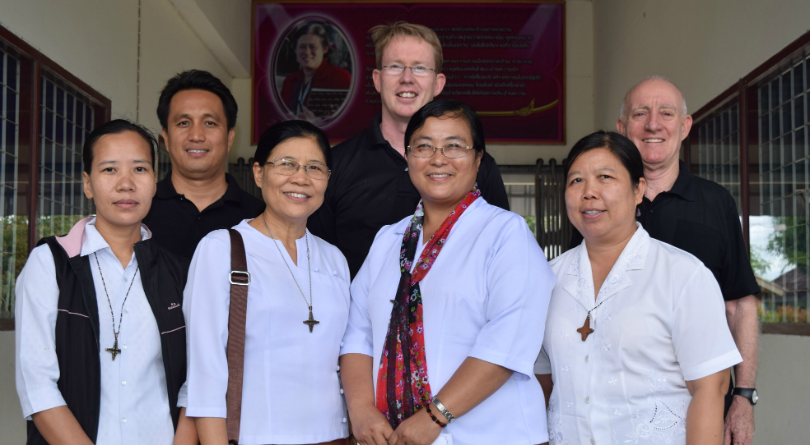 Compassion is at the heart of the Marists and Mission Sisters. To care for the most abandoned like a Mother, and to go out to the poor with joy and the love of God in our hearts.
Compassion is at the heart of the Marists and Mission Sisters. To care for the most abandoned like a Mother, and to go out to the poor with joy and the love of God in our hearts.
Over the past seven years the Marists and Mission Sisters have served together, showing compassion in action among Burmese Migrant families in Ranong.
With the highest density of Burmese Migrants in Thailand, one of the highest HIV rates, with only 10% of children starting school and 90% of these children finishing at age 12, Ranong has one of the highest number of child labour rates in Thailand. There are continued and great needs.
Poverty creates daily challenges for food, shelter, health. Families break up, husbands away on fishing boats for months at a time leaves wives and children in difficulties. Education is often a luxury they cannot afford. Yet it is a vital key to lifting families from poverty.
Recognising the call to lift up the lives of their own people suffering as Migrants in Thailand, Mission Sisters have served since 2009 in the HIV AIDS Health Programme and the Burmese Migrant Secondary Education Programme.
The witness of compassion as religious sisters, knowing and speaking their peoples own language, understanding their customs and traditions, allows the Marist Asia Foundation programmes to be inserted more deeply into the life of the local Burmese Community.
While the sisters have been working in Ranong for several years, Sr Helen recently arrived and says serving as a teacher is an enriching experience.
“Working in Ranong with the different people and religions is a first experience for me in my life. Though I was nervous at the beginning, their lovely smiles and friendliness make me happy, and give me courage and strength to serve in my life as a teacher and sister”.
God’s works are wonderful and beautiful among the different people, culture, and different faiths. I learn how to live and work together with understanding, respect and love.
Sr Margaret, who has worked in the HIV AIDS Health Programme since 2008, describes her presence and ministry among her people as being like ‘salt’.
My life is small like the smallest salt but I know it can change things and make delicious testing food and protect from infections. My life as an RNDM sister will always be caring for the poorest peoples, and encourage them to understand God’s mercy and compassion.
Everyday I try to understand the needs of their lives by visiting them and living among them and helping them practically. I am not a trained medical professional but I can show and share with them a healthy way with their diseases. I can’t do this work myself. Action and pray life go together.
Together, Showing Compassion in Action, patients become well, children receive education, lives are filled with hope. Thanks to the RNDM Sisters for your years of love and service, and response to the needs of Burmese Migrants.
Together we are making a huge difference to the lives of thousands of Burmese Migrants away from their home of Myanmar.
Volunteering – A day in the life of Ranong
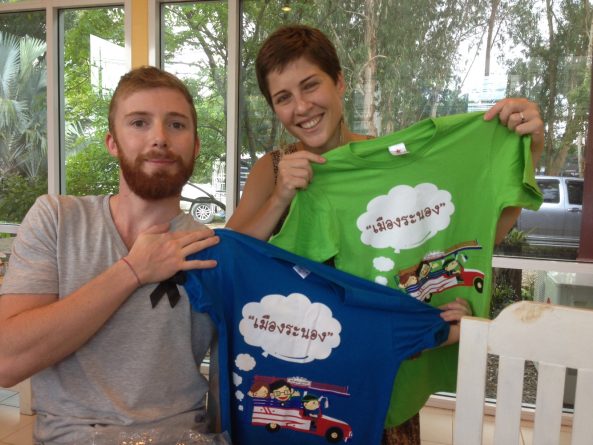
O Ranong! A place not known for its tourist activities, but somehow it has a pull on us. Here’s a typical day for us:
4am Mr. Rooster wakes us. 5am Mr. Rooster again, ahead of schedule. 8am and we’re up and in to the kitchen to make pancakes for breakfast. The neighbourhood kids are outside making a couch and TV set with polystyrene. Boil up some water to make our bath-shower and we’re nearly ready to go. Blue Marist tops on, check. Ponchos, check.
The sun’s peeping out to expose a fresh glimpse of the nearby hills amidst the low cloud that usually blankets the city, what a calm morning. Hi to the family downstairs, throw a leg over the scooter and off. At the intersection the traffic has stopped for a firecracker centred festival, seemingly erupted from nowhere.
We kill the engine, transfixed. Class soon, so better rip our eyes away from i t and find back streets to sneak past the snaking festival. ‘Eww!’, Kristen yells from behind me. Must mean she saw another mangy dog specimen trudging along the sidewalk. We wind past a few heaving, ever-present fish lorries with their morning load from the docks. Slowly brace ourselves for the kamikaze like journey over the potholes on school road. We’re here at MAF.
t and find back streets to sneak past the snaking festival. ‘Eww!’, Kristen yells from behind me. Must mean she saw another mangy dog specimen trudging along the sidewalk. We wind past a few heaving, ever-present fish lorries with their morning load from the docks. Slowly brace ourselves for the kamikaze like journey over the potholes on school road. We’re here at MAF.
English class first. My class is doing revision on ‘will’ and I’ve prepared the day before. I ask about their weekends using some prompts on the whiteboard. Now time to open your books to page 118, class! The lesson races by and as I leave some students hand in extra homework and ask me to mark their voluntarily written essays. Ok, sure!
Time now to prepare for Social Studies class. Human Rights. How do I make this stuff interesting? How do you explain to a Burmese child the concept of having the right to speak freely?! I know, I’ll try a drama.
Lunchtime hurtles round and the girls are getting more involved in volleyball, so good to see. It has started to drizzle and that means one thing. You have 30 seconds until torrential downpour. Quick, ponchos on! Lunch is a quick visit to ‘Thai lady’ for a tasty noodle dish which is reached by a plastic-swamped lane – waste management is low on the list of priorities for people whose kids haven’t ever gone to school. Makes you think.
After eating I’ve got to leave for Ban Maria- the primary learning centre run by the church. Partnering with a brilliant local teacher, we’re trying to get the kids confident in vowel pronunciation. Eventually we make some progress and the students can write the Burmese forms in their book. Success!
Now I’ve got a bit of time so I scoot off to a favourite café, order a coffee, and catch up with the Latvian owner. She’s always full of stories and insights in to the world of Ranong. Back at MAF, it’s the last lesson of the day and my students are going stir-crazy. I let them head upstairs for some more space. It’s great that the management give you the books and resources, explain it, and then let you be creative.
School’s done for the day. The little pre-schoolers file down the steps with their baskets that house their lunches, toothbrushes and other essentials.
With adorably precise haircuts they march up onto the back of the school bus, which is really an overhauled ute with a metal cage on the back and two long seats skirting the sides. ‘Good Morning’, they yell while waving wildy, almost dropping their baskets. It is well into the late afternoon.
After class we relax and debrief each other on our days. Dinner is invariably at our ‘Corner Café’ but our attempts at convincing the staff to make us a ‘mai phet’ (not spicy) Thai salad fail every time. We’ll have three sides of coconut water to wash it down, thanks!
Kristen and Luke were a couple from New Zealand who came for a couple of months and made a tremendous difference. Thanks to you both 🙂
I’ve learnt lessons I will never forget
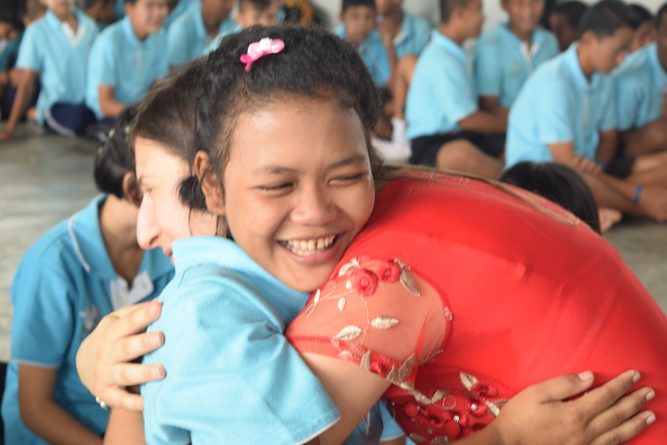 For young Europeans of my generation who have grown up in a continent without boundaries, the border has always represented an abstract concept rather than an obstacle or concrete physical limits. With our roots firmly anchored and grounded far beyond our national borders, we’ve travelled, worked and also loved crossing freely those faded lines on the maps.
For young Europeans of my generation who have grown up in a continent without boundaries, the border has always represented an abstract concept rather than an obstacle or concrete physical limits. With our roots firmly anchored and grounded far beyond our national borders, we’ve travelled, worked and also loved crossing freely those faded lines on the maps.
We’ve developed a sense of unity, the awareness of being part of something larger than our little selves and, quoting a well-known figure, that “the earth is but one country, and mankind its citizens”.
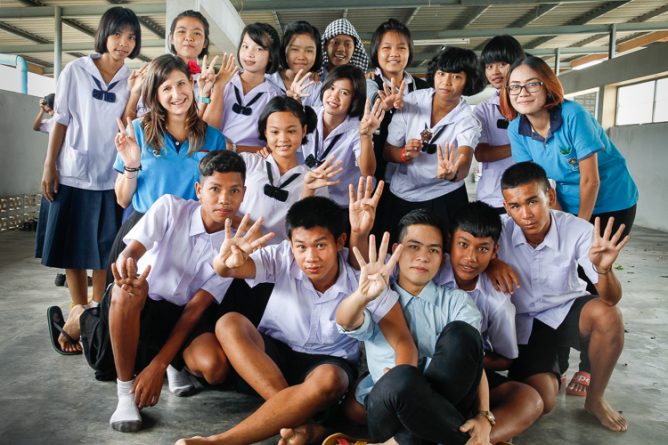 At least in Europe, the only boundaries that we have always had to deal with were those generated by our minds, the boundaries that we ourselves have drawn.
At least in Europe, the only boundaries that we have always had to deal with were those generated by our minds, the boundaries that we ourselves have drawn.
It has always been a matter of lines: the lines that separated us from achieving our goals, the intangible lines that we have drawn to separate us from the people who surround us, that, as time passed by, we’ve turned into barriers hoping that nobody overcomes them.
And while the European Union is now busy restoring borders and boundaries through walls and kilometers of barbed wire, young people of my generation feel suffocated by these lines.
Just when you try to put your head above the parapet and have a look beyond the border that you feel that sense of emptiness. A mixture of fear and desire that push the most adventurous of us to pack up and take a chance, crossing borders, driven by the desire to discover what lies on the other side.
For all these reasons, I decided to spend almost one year of my life in Ranong, a border town between Thailand and Myanmar. Ranong is one of those places on Earth where the border can be so slight and, at the same time, heavier than any other barrier.
Because of their experience of oppression, poverty, and lack of work opportunities in their own country, many people from Myanmar decide to cross the border and come here in Thailand searching for a better future for themselves and their families, but most of the time what they find is a hard life full of tremendous challenges: fraud and abuse; lack of access to healthcare, educational opportunities and other resources due to the nature of their migration status.
Here along the Thai-Myanmar border, where the Marist Asia Foundation serves the poorest Burmese migrants through education and health programs, I was surrounded by these amazing people who have shaped my life over the last year. Thanks to them I’m not only another year older but another year wiser.
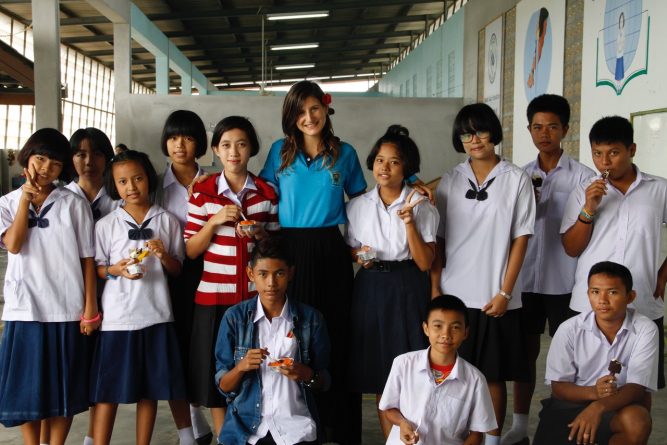 Even if I was supposed to be the teacher for the students of the Burmese Migrant Secondary Programme I think that inside those classes I’m the one who learnt most.
Even if I was supposed to be the teacher for the students of the Burmese Migrant Secondary Programme I think that inside those classes I’m the one who learnt most.
At the beginning, the students were so shy and silent, but their big smiles made me feel immediately at ease. And this is how it started.
As time passed, they became less shy and more talkative and they started sharing with me their life and their experiences, despite language difficulties. I’ve discovered how hard their life can be, but wonderfully their smiles have never changed.
From this experience, I’ve learned that life can be extremely hard at times, but you never have to get tired of smiling.
I’ve learned the power of acceptance, that doesn’t mean resignation, but simply do not spend your energies focusing on what cannot be changed, ruining the serenity of your day.
I’ve learned that happiness doesn’t come as a result of getting something that you don’t have, but of being thankful for all you have.
Three simple life lessons that I hope I’ll never forget!
Marist Asia Foundation is thankful to Caritas Italiana for sending young Italian Volunteers to support the Health and Education Programmes over the past several years. Their presence and support has reminded our Burmese Migrant Children and families of the love and support of so many people from around the world
Migration – so many people talking but not listening
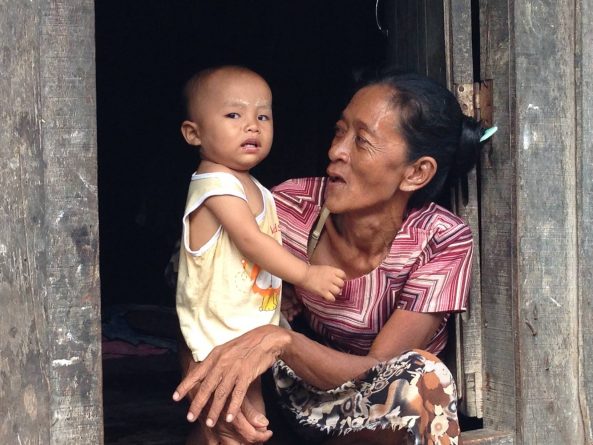 Many people talk about migrants but don’t listen to their stories. Compassion happens when we really listen to another’s story.
Many people talk about migrants but don’t listen to their stories. Compassion happens when we really listen to another’s story.
Archbishop Charles Bo, the leader of the Catholic Community in Myanmar recently shared a moving message highlighting the pain and also the hopes of so many migrants and refugees forced to remain ‘away from their home’ of Myanmar.
It is a striking message highlighting the challenge of migrants and the response of host countries.
He asks that we become like parents to the ‘orphans’ who arrive in foreign lands.
We urgently plead with all bring peace. Do not displace our people. Our families are broken into pieces. Please give a chance and make our people be united in the families. Pope Francis calls for the integrity of families as the first duty of all. We urge you unite our families. Let our children live with their parents, and parents have the joy of seeing their children every day.
Below is his full message delivered on a special day for the People of Myanmar – Parents Day – when families and communities celebrate and show great respect to their parents.
Parents’ Day Message and Prayer – Charles Cardinal Bo, Yangon Myanmar, 2016
God is our Father. God is our mother. The Bible has a beautiful sentence. Even if the mother forgets her child, I shall not forget you. When we honor our parents we honor God himself. I extend my prayerful wishes to all the parents. The Bible is full of praise for parents. It opens with the first parents. Abraham is our father of faith. We have the holy family. Jesus was brought up by two holy parents. Parents are closer to God since they cooperate in bringing life to this world. Life is a gift from God. Parents are willing to receive that gifts and nurture it and help the life to go.
But this year we wish to turn our attention to those who are away from our dear mother land – Myanmar. We know we are around 55 million people. We are from 135 tribes. We are all sons and daughters of this nation. But this year I wish to bring to our attention the heart breaking conditions of millions of our brothers and sisters who are living like orphans away from this land.
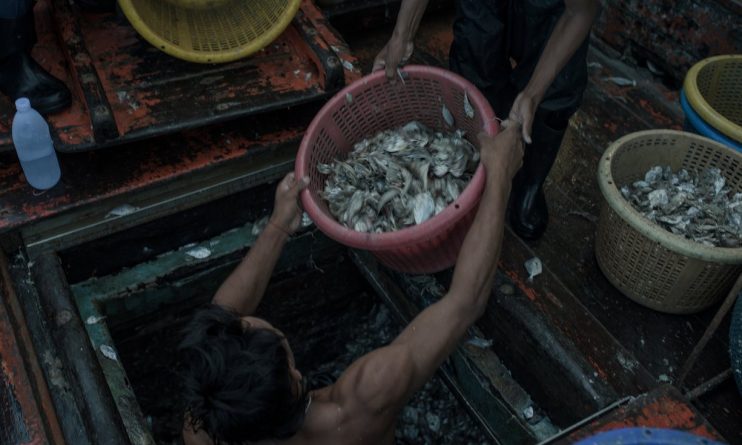 Migrant workers without any legal protection
Migrant workers without any legal protection
Nearly three million of our brothers and sisters do not live in this mother land. They are living in foreign lands. Many of them left in the eighties and the nineties – often trafficked by the human trafficking mafia since this great nation and its rulers those days refused to give a quality education, refused to create local opportunities for employment, our innocent youth were forced into risky migration.
Many of them are slaves in Thailand, in Malaysia and in China. Recently we read about the ‘ boat slaves’ who were chained to the boats every day after their work. They are all from Myanmar and some of them were considered dead by their families because they could not communicate with the outside world. Our heart goes to them.
We appeal to authorities; these are made orphans by an inhuman system. Our Myanmar people are graceful people, non-violent and kind to all and this has become a liability. They have become the slaves of South East Asia. I urge the government to become their parents and bring them home. This land belongs to them. They are not orphans.
Refugees in the Camps
Thousands fled the civil wars of the last five decades. Many were given asylum in the first world countries. But thousands were waiting in futile hope of being resettled in the third country. That hope is turning into a night mare. No third country is willing to accept them. For decades our people termed as refugees are standing in queues looking for the international handouts. But these hand outs are dwindling. International community is tired of the Myanmar refugees. The camp conditions are abominable. We recently made a visit to these camps. These are black holes of despair sucking our people into a bottomless bit of despair and inhumanity. These are children forgotten by mother Myanmar.
I urge the government of Myanmar and Thailand and the UN agencies to accelerate the process of safe return and rehabilitation of thousands of our country men and women. I urge the government to hand over the lands of our people, ensure quality education and employment, making the return a dignified process for our people whose camp life is really turning into a valley of bones.
I urge the concerned people to blow the spirit of hope into these camps and let the children of Myanmar come back to their mother land. They cannot sing the Lord’s song in an Alien land.
IDPs internally displaced people inside Myanmar
War, mines, natural disasters, and dams have displaced nearly a million in our country. They are away from their homes. Nearly 300,000 of victims of civil conflicts languish in the camps. Their youth are not with them. Their families are fragmented. Youth are trafficked to China, to Thailand and to Malaysia. Their mothers cannot be consoled because unscrupulous elements snatch their children.
Modern day Herods target a whole generation through war and displacement. The lands of our people are confiscated by those who have guns – both the government and non-state actors are cul pable in making our people orphans – depriving them of their core identity – land. Millions of acres of our people’s land have passed on to the cronies and companies. Our people are refugees in their own land. These landless people are the latest and the largest group of orphans.
pable in making our people orphans – depriving them of their core identity – land. Millions of acres of our people’s land have passed on to the cronies and companies. Our people are refugees in their own land. These landless people are the latest and the largest group of orphans.
We urge the international community to pressurize both the government and the non-state actors to return the lands of our people.
Our brothers and sisters – victims of fear and continuing war
Thousands of Karens and Kachins are like children without parents. They are refugees for decades. Land mines abound in their original places. War continues. They want to come back but fear chokes their spirit. If there is no peace, millions of our people are made orphans due to fear. They refuse to return. How can we be happy of return of democracy and a leadership lauded for moral witness when millions cannot be at peace? Myanmar needs peace. War has created conditions that are like an orphanage in many parts of our country. Our people are orphaned when the state and the non-state actors instill great fear in them with arms.
In many places our innocent people have to face two governments and two armies. We urgently plead with all bring peace. Do not displace our people. Our families are broken into pieces. Please give a chance and make our people be united in the families. Pope Francis calls for the integrity of families as the first duty of all. We urge you unite our families. Let our children live with their parents, and parents have the joy of seeing their children every day.
People of Good will who are away from their parents because of sacrifice to their fellow human beings
I wish to send my wishes to Myanmar brothers and sisters serving in many nations, as church personnel, NGO workers and in other vocations. You are away in a sign of great sacrifice. You have brought joy and hope to thousands where you serve. You have sacrificed the joy of seeing your parents and dear ones, while you serve people from other cultures. May God be your father and mother and we pray that your sacrifice be rewarded hundred fold.
I also gratefully wish all those foreigners, church personnel, NGO personnel and others whose contribution to this nation and church is an abundant blessing. You have made this your country; you have made our people your brothers and sisters. Many of you are away for a long time from your families and parents. We wish you a great day and affirm our filial love to you ensuring our grateful sentiments. You are our brothers and sisters. As a nation we are marching towards a destiny of hope. We expect our leaders to be like our parents showing no discrimination based on creed or race.
As a church we assure that it will be a kind and merciful parent to those at the margins. As a church we affirm our commitment to serve the migrants, refugees, IDPs, and those who are away from homes. God was the parent to Adam and Eve. God was the parent to the Jews who became slaves in Egypt. God was the father who sent his only son to redeem the world. It is the same father, the Abba, protects us all today.
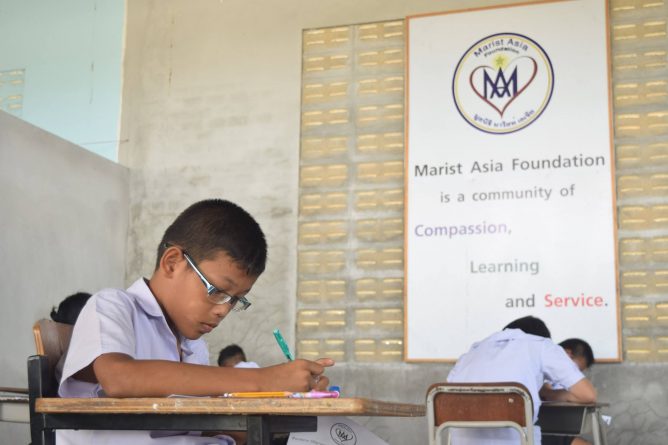 Marist Asia Foundation celebrates 10 years of supporting Burmese Migrants in Ranong in 2016 with Education, Health and Migrant Support Programmes. We are grateful to so many funding agencies, friends and supporters that allow us to show compassion in action and grow a positive hope for the future in the lives of young Burmese Migrants.
Marist Asia Foundation celebrates 10 years of supporting Burmese Migrants in Ranong in 2016 with Education, Health and Migrant Support Programmes. We are grateful to so many funding agencies, friends and supporters that allow us to show compassion in action and grow a positive hope for the future in the lives of young Burmese Migrants.
University Education Partnership
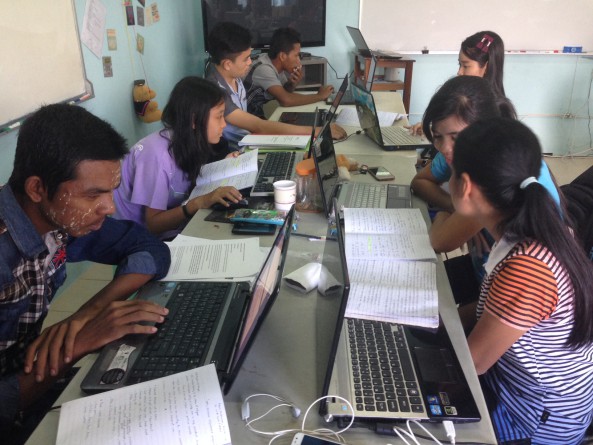
Australian Catholic University (ACU) has partnered with Marist Asia Foundation since 2009 and is committed to providing Higher Education Opportunities for Burmese Migrants for the next 5 years.
Australian Catholic University has entered into a new partnership with Marist Asia Foundation to support Burmese Migrants gaining a University Education for the next 5 years.
ACU’s Thai Burma Border Programme, supporting Burmese Refugees and Migrants has been running for the past 10 years, but has partnered with Marist Asia Foundation since 2009.
This partnership has changed the lives of many young adult men and women who would otherwise never get a Higher Education in the Refugee camps or Migrant Worker communities.
Students in Ranong study online and with visiting lecturers to complete their Arts and Liberal Studies Diploma. Courses include Academic English, International Development Studies, Youth Development, Introduction to Management, Global Health Challenges, Human Rights, Global Change and Development, Education for a Sustainable Future.
Fr Kevin Medilo, Director of Marist Asia Foundation, met recently with ACU staff in Sydney and shared how significant the University Online Diploma Programme is for the Migrant Community in Ranong on the Thailand Burma Border.
26 young leaders have graduated and become Teachers, Health Workers, Community Leaders. We have 12 current students and another 20 waiting to apply for the 2017 year.
The ACU Partnership is changing the education goals of the migrant community.
Young students are staying in school. Graduates are getting good jobs. Bright young confident Burmese Migrants are conscious of human rights and they are understanding the complex development needs of their home country in Myanmar.
Our University students are emerging as great role models and leaders for their community.
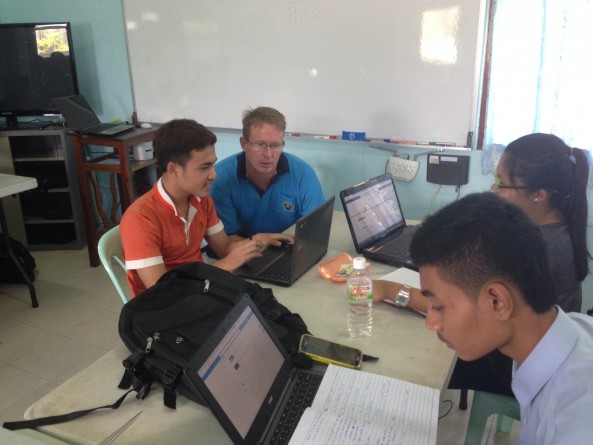
Students study Monday – Friday 1.30-4.00pm with their tutor Fr Frank Bird to complete their Diploma in a 20 month course aimed at developing Leaders and Teachers for the Burmese Migrant Community
Discussions also took place to plan together for the future, including investigation of a Teacher Training Diploma that can give the many young migrant teachers an opportunity to get recognised qualifications as teachers.
This is such a vital need on the Thailand Burma Border with hundreds of thousands of migrant and refugee children struggling to get an education and their teachers struggling to get recognition of their learning and teacher experience.
Marist Asia Foundation is delighted to deepen its education and funding partnership commitment with ACU and would like to express its great thanks to Professor Tania Aspland (Executive Dean), Professor Geraldine (Deputy Dean, Faculty of Education and Arts) and Kirk Doyle (International Partnerships) for the work on developing this Education Partnership.
Special thanks also to Teacher Maya, Co-ordinator of the Thai Burma Border Programme, whose great passion and encouragement toward our Migrant and Refugee students has encouraged so many to ‘aim higher’ for a brighter future with education.
- « Previous Page
- 1
- …
- 4
- 5
- 6
- 7
- 8
- …
- 25
- Next Page »